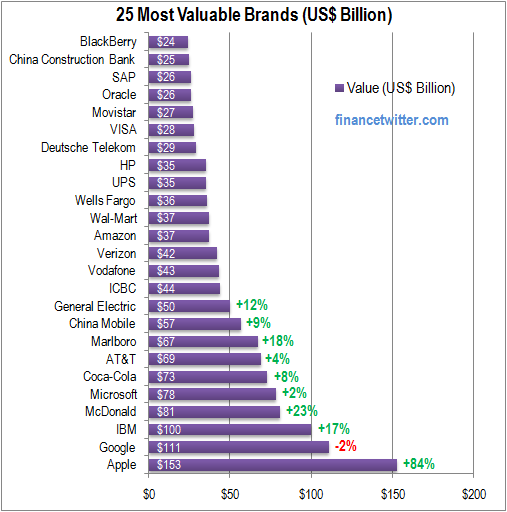Finally, Apple Inc. has surpassed Google Inc. to become the world’s most valuable brand, thanks widely to the popular iPhone and iPad. It is indeed a sweet achievement considering Apple brand actually jumps a whopping 84% increase compared to last year. Apple is way ahead of Google with its brand valued at US$153 billion while the search engine in second place at US$111 billion.
Third place was computer pioneer IBM Corp., who’s brand is worth $100 billion, a 17% increase from last year. McDonald’s, Microsoft and Coca-Cola are at No. 4, 5 and 6 respectively and all of them improve compared to last year ranking. Of the top 25 most valuable brands, Warren Buffett’s Wells Fargo improved the most, jumping 97% compared to last year while BlackBerry at 25th place dropped the most about 20%.
Apple Inc. (Nasdaq: AAPL, stock) may be the most valuable and admired company now and hopefully it will stay so for a long time to come. People simply love the brand because its products especially the iPhone and iPad are simply genius. But that’s as far as if you’re the consumers. So just how the America’s most successful and secretive company really operates in order to deliver the almost perfect products?
As Apple’s employees you’re being appraised and monitored with nanoscale precision. There’s no room or very little space for error and Apple can be compared to the U.S. Navy SEAL team that evaded Pakistan’s air force detection, flew deep into their territory, killed and brought Osama bin Laden body back to the base in Afghanistan – only to call Pakistan about the operation after mission accomplished.
When Apple launched the first version of iPhone back in summer 2008, Steve Jobs also proudly presented the MobileMe (formerly .Mac and iTools), an e-mail system that was supposed to provide the seamless synchronization features. However MobileMe was a flop so much so users complained about lost e-mails and subsequently ignored MobileMe service altogether.
Steve Jobs was so furious that he summoned the MobileMe team shortly after the iPhone launch. The meeting was held in Building 4 of Apple’s campus and according to a participant, Jobs walked in, clad in his trademark black mock turtleneck and blue jeans, clasped his hands together, and asked a simple question:
“Can anyone tell me what MobileMe is supposed to do?” The MobileMe team responded and having received a satisfactory answer, he continued, “So why the fuck doesn’t it do that?”
Jobs continued for the next half-hour, still furious – “You’ve tarnished Apple’s reputation … You should hate each other for having let each other down … and Mossberg (influential Wall Street Journal gadget columnist), our friend, is no longer writing good things about us.” On the spot, Jobs named a new managers to run the group.
Steve Job’s handling of the MobileMe issue offers a rare glimpse of how Apple really operates. Inside Apple’s campus the environment is a brutal and unforgiving place, where accountability is strictly enforced, decisions are swiftly made and communication is articulated clearly from the top (so you better take it seriously). Employees who are promoted to Vice President would receive little “speech” from Steve Jobs.
He tells every incoming Vice President on why they cannot rely on “excuses” and “reasons”. He says these things are important for hourly employees such as janitors, but unacceptable for managers. If the garbage in his office is not being emptied regularly for some reason, he would ask the janitor why. The janitor could respond by saying, “Well, the lock on the door was changed, and I couldn’t get a key.” This is an acceptable excuse coming from someone who empties trash bins for a living.
However, while the janitor gets to explain why something went wrong, senior people do not. “When you’re the janitor, reasons matter … Somewhere between the janitor and the CEO, reasons stop mattering,” – Steve Jobs said. The little dictator accepted no excuses for poor performance. Jobs would have meeting with executives to review every important meeting on every Monday while marketing and communications meetings would be held every Wednesday.
Interestingly, job scopes are defined to a very high precision that despite some conflicting interests during meeting, there’s seldom clashes between different team, thanks partly to Apple’s DRI (direct responsible individual) manual. Steve Jobs, anticipating his demise one of this day, had personally handpicked the dean of Yale’s School of Management, Joel Podolny, to both head Apple University (Apple’s internal training programs) and lead a group of business professors (many of whom were from Harvard) to collect case studies to be used after the CEO’s death.
Steve Job’s objective is to make sure that even when he dies, that he lives on in the company’s leadership and management style. Now, he really sounds like the China’s First Emperor, Qin Shi Huang, doesn’t he?
Other Articles That May Interest You …
- Celcom Launches iPhone 4 – Sexy Plans vs Maxis & DIGI
- Great iPhone Sales Saves iPad’s Backlog – Stock Up
- Don’t Trust Gartner’s Smart-Phone Market Forecast
- iPad 2 Launch: 13 Things That May Interest You
- Obama Dinner – Steve Jobs, Mark Zuckerberg are VVIP
- Apple’s Blowout Earnings & Steve Job’s Medical Leave

|
|
May 10th, 2011 by financetwitter
|


|

|

|

|

|

|































[…] Apple, Most Valuable Brand – Little Secret Of Its Dictator […]